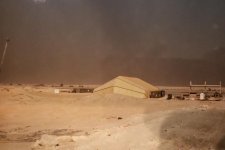It began to dry out a bit, but the nights were still cold. I didn't have any assigned duty all this time, our hospital CO, a superb Family Practice physician, one of the finest military commanders I have ever known, with prior military experience, had just told me a month before, back at Riley, "...go, you are going with the Advance Party." By then I was a 20 year LTC, about half of that on active duty, and I was the only one in our hospital with prior wartime experience. So, I just did the things I thought necessary, without any official command authority.
While we had been back at Ft Riley, I was sent to a week's Chemical Warfare training. So, I was by default our Hospital's chemical officer. All of us were issued two MOPP suites, quilted charcoal impregnated tops and bottoms, and of course our decontamination kits and protective masks. No beards were allowed, as it is impossible to get an air-tight seal with a beard.
Later on, when our Hospital's chemical casualty team was selected , having had training back at Riley, I took them aside and told them I would be on the "Hot" or contaminated side of our Hot Line with them. I promised I would be by their side when this dangerous task was necessary.
more...
All the best and stay safe.... SF VET.

While we had been back at Ft Riley, I was sent to a week's Chemical Warfare training. So, I was by default our Hospital's chemical officer. All of us were issued two MOPP suites, quilted charcoal impregnated tops and bottoms, and of course our decontamination kits and protective masks. No beards were allowed, as it is impossible to get an air-tight seal with a beard.
Later on, when our Hospital's chemical casualty team was selected , having had training back at Riley, I took them aside and told them I would be on the "Hot" or contaminated side of our Hot Line with them. I promised I would be by their side when this dangerous task was necessary.
more...
All the best and stay safe.... SF VET.














